As parents and guardians, it’s our duty to become keen observers and open-hearted confidants. Our children, despite their resilience, can encounter profound stressors, and deciphering these cryptic signals is paramount.
According to research, children have different reactions to their external surroundings than adults. Cultural values play a big part in the way children show signs of stress and overwhelm in their responses. Hence, as parents we have to be aware of these stress indicators.
As parents we all wish for happiness for our children. Unraveling the reasons behind their stress empowers us to act. By the end of this article, you will get an understanding of how stress manifests in children and what are the 5 signs that you need to be aware of.
Understanding Childhood Stress

Stress in children differs significantly from stress in adults. While stress is a natural response to change or adaptation in a child’s daily life, it can play a positive role in their development. However, when stress becomes overwhelming, it can lead to severe mental health issues in children.
From minor daily changes to significant life events, their ability to adapt and respond to these stressors is essential for their growth and development.
When a child faces excessive or prolonged stress without adequate support, it can have detrimental effects on their mental health. This is why it’s crucial for parents and caregivers to recognize the signs of stress in children and provide the necessary guidance and support to help them navigate life’s ups and downs.
Read More: What Are Family Dynamics? Is Your Family Dynamics Uplifting or Weighing You Down?
What are the reasons for Stress in Kids?
Stress is a general response that a child makes to any change or adaptation in their daily lives. Stress can be a positive aspect of the development of children.
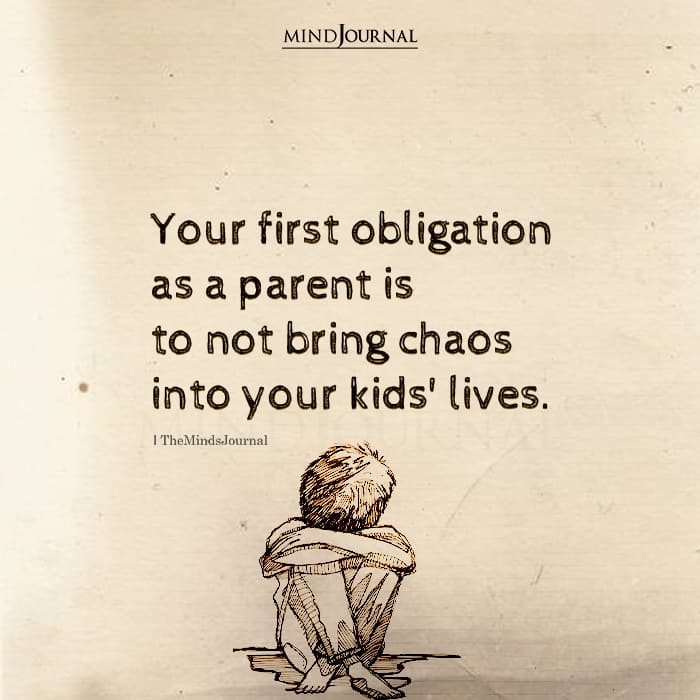
The following are some of the factors causing stress in children.
1. Separation Anxiety
Moms and dads, take note – even the littlest bundles of joy, from babies to toddlers, can experience this emotional roller coaster. According to researchers, Seperation Anxiety can be a positive response of the child getting separated from parents, in which the child can improve their cognitive abilities.
However, it is also a direct response of the child towards a new surrounding such as a new babysitter.
When life introduces stress, children’s ability to handle other challenges often takes a hit. This can result in heightened clinginess, tearful goodbyes, or a palpable nervousness when they find themselves separated from their trusted caregivers.
2. Family Change
Major family shifts, such as loss, divorce, job changes, or moving to a new home, can send ripples of stress through children of all ages. It’s like rearranging the furniture in their emotional home – even positive changes, like welcoming a new sibling, can shake things up.
Read More – 4 Reasons Staying In A Bad Marriage Is Worse For Kids
When it comes to stress, it is important that parents understand change in itself is a stressful event for a toddler. Change equates to a departure from the norm, and this departure can provoke stress reactions in children of all ages and is a major reason for mental health issues in children.
3. Increased Academic Pressure
School is a place to learn, grow, and discover new things. But it’s also a place where kids, teens, and young adults can all feel the effects of stress.

The pressure to excel academically can sometimes feel like an uphill battle for our young scholars. Their minds are often occupied with concerns about homework, exams, and the pursuit of top grades.
Friendships, navigating social situations, and the temptation of popular opinion are all important aspects of school that must be navigated. Anxiety and tension can be triggered by these social complexities.
Read More: Children’s Mental Health – Signs of Mental Illness In Children
What are 5 Signs of Stress in Children?
It’s crucial for you as parent to remain vigilant and attentive to the well-being of your young ones. Here are eight telltale signs that may indicate your child is grappling with stress:
1. Nightmare: Stress in Kids
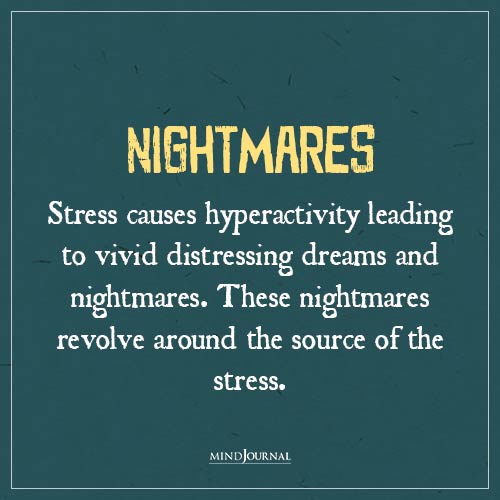
Are your child’s dreams of adventure turning into nightmares? Did you know that these spooky nighttime escapades can sometimes be a sign that stress is lurking in their little minds?
As a parent this is itself a stressful event, however, you have to remember that you are your child’s support system and guide. Therefore, it is important that you as a parent should remain calm and try to comfort your child and create an atmosphere of safety.
We also suggest that you utilize bed time stories as a way to comfort your child. Share stories about brave kids just like them, facing down their own fears and conquering those pesky monsters under the bed!
2. Aggression: A Stress Sign in Children
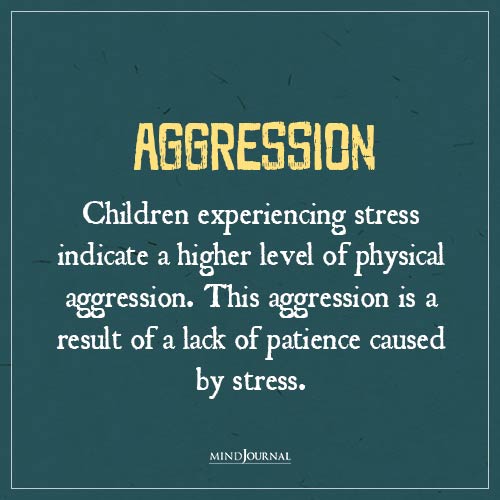
Are you noticing increased levels of aggression in your child? Is your child biting, kicking and even showing instances of verbal aggression? These are the telltale signs that your child is not being able to cope with the stresses he/she is facing.
Children who are stressed exhibit both verbal and physical violence, as well as a lack of patience. This is especially noticeable in youngsters who are assigned tasks that require a high level of attention to detail.
Read More: 7 Useful Tips For Calming Children With Autism During Angry Outbursts
But fear not, because you’re their guiding light in this battle! It’s all about helping them discover healthy ways to manage and channel that inner anger. Encourage them to explore deep breathing exercises to calm the storm within, or perhaps dance to soothing tunes that act as a tranquilizer for their emotions.
3. Bed wetting: A Nocturnal Stress Sign
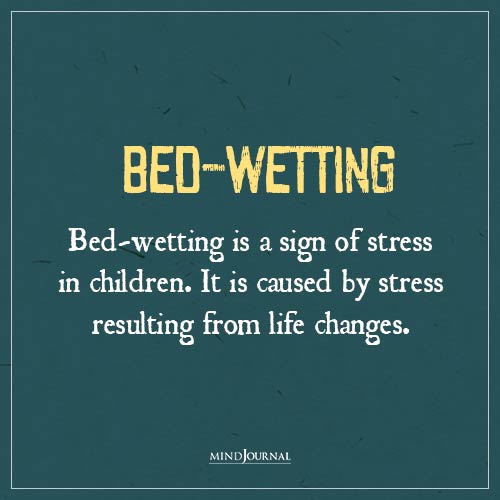
Is your child’s bedwetting turning dreams into nightmares? Did you know that bedwetting can often be a telltale sign of mental health issues in children?
Bedwetting, also known as nocturnal enuresis, isn’t just about accidents in the night; it can be a window into your child’s emotional world. Stress in kids, especially the kind that results from various life changes or challenges, can manifest itself in unexpected ways – and bedwetting is one of them.
Comfort your little one by letting them know that accidents happen, and they’re not alone on this nighttime adventure. Reassure them that you are beside them, and together, you’ll get to the bottom of this problem.
Read More: What Is Childhood Trauma? 4 Signs of Lingering Childhood Hurt
4. Hyperactivity and Stress in Kids
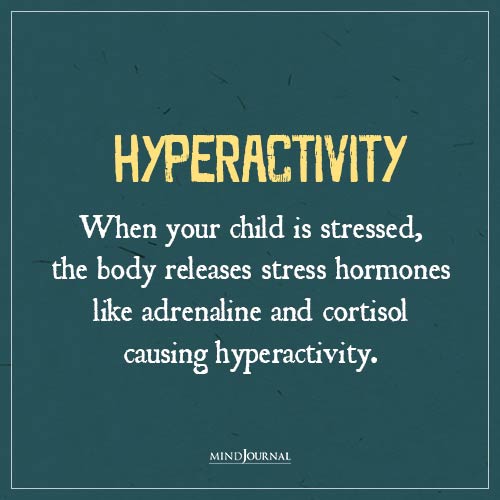
Have you ever noticed how, in the presence of stress, children can transform into energetic powerhouses? They seem like pint-sized superheroes, yet occasionally, their superpowers seem to be misdirected. This leads to a pressing question: How can we guide them to channel this energy constructively?
Equipping them with the practice of deep breathing exercises is akin to providing them with a hidden power, a means to confront the challenges of stress in kids. By introducing these enjoyable activities, we empower them to optimize their boundless vitality, thus aiding in managing stress in kids and promoting children’s mental health.
5. Stress In Children and Loneliness
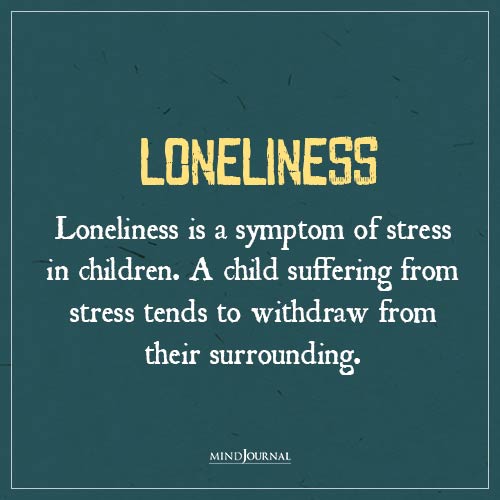
Loneliness often creeps in during significant life changes, which can impact kids’ mental health. It’s a silent battle they sometimes face. But here’s the key: you can be their steadfast partner in combating this solitude!
Start by maintaining stable routines in their daily lives. Predictability can offer a sense of security, which is crucial in dealing with signs of stress in children. Consistency can become a powerful tool in nurturing kids’ mental health.
Additionally, open and regular communication with their school can make a substantial difference. Schools play a pivotal role in a child’s life, and keeping the channels of dialogue open can help identify and address any mental health issues in children.
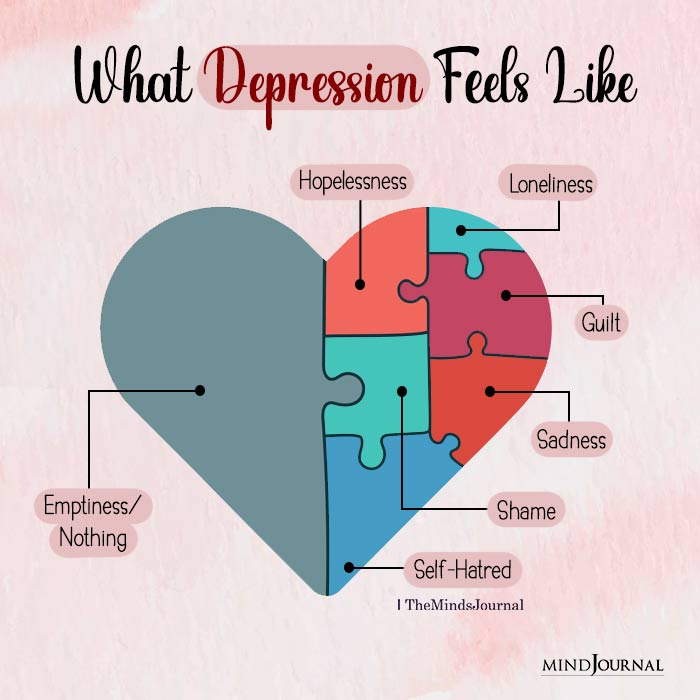
Supporting Your Child’s Mental Health
Children have unique responses to external stimuli, influenced by external factors. Therefore, it is crucial for us as parents to be aware of these stress indicators, especially in the context of kids’ mental health.
Stress in kids is a natural response to life’s changes, but excessive stress can lead to severe mental health issues in children. Separation anxiety, family changes, academic pressures, and other factors can all contribute to stress in kids.
You are not alone in this endeavor. As you continue to observe and engage with your child, you will be better equipped to identify those vital signs of stress. And as you do, you’ll create an atmosphere of understanding, comfort, and support that empowers them to conquer any emotional challenges they may face.
Your child’s mental health is a treasure, and you hold the map to safeguarding it. Together, you can unlock their potential, nurture their resilience, and embark on a journey towards lasting well-being.
Frequently Asked Questions (FAQs) –
Q1. What are the telltale symptoms of stress in kids?
Ans. Stress in kids can manifest in various ways. Watch for nightmares, increased aggression, bedwetting, hyperactivity, and withdrawal from family and friends. These are common symptoms that may indicate your child is dealing with stress.
Q2. How Can I Help My Child Cope with Stress?
Ans. Start by creating an open and safe space for your child to express their feelings. Encourage communication and explore calming activities like deep breathing exercises or soothing music. Maintaining routines and staying connected with their school can also make a big difference in helping your child cope with stress effectively.
Q3. Is Stress in Children a Normal Part of Growing Up?
Ans. Stress is indeed a natural response to life’s changes and challenges, even for children. In fact, some stress can be beneficial for their development. However, when stress becomes excessive or prolonged, it can lead to severe mental health issues.
Q4. What are the main causes of stress in children?
Ans. Stress in children can stem from various sources. Common causes include separation anxiety, major family changes like divorce or moving, increased academic pressure, and the challenges of navigating social dynamics at school.
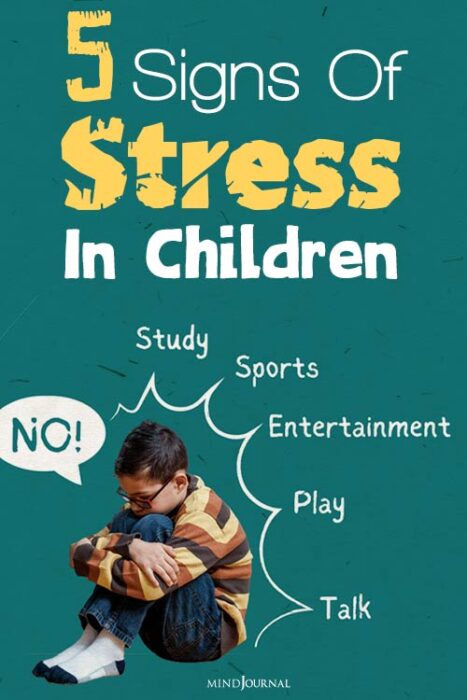
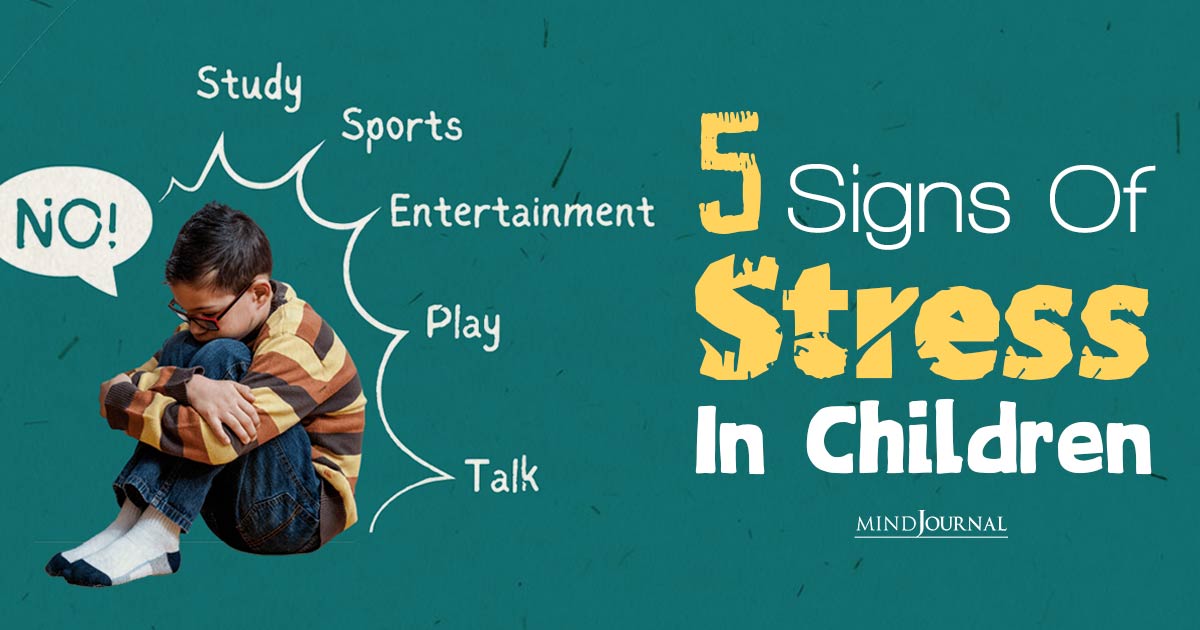







Leave a Reply
You must be logged in to post a comment.